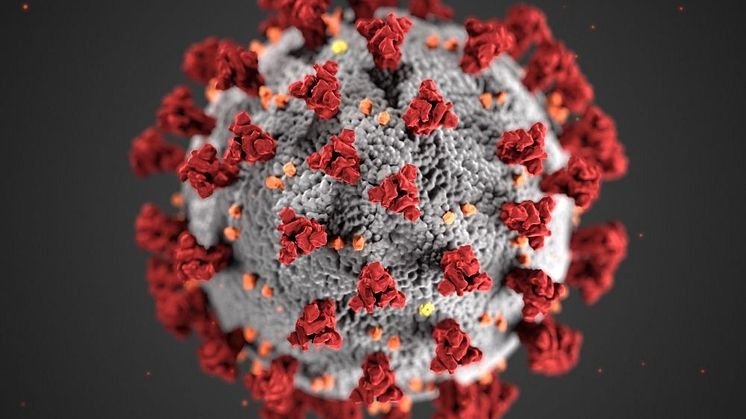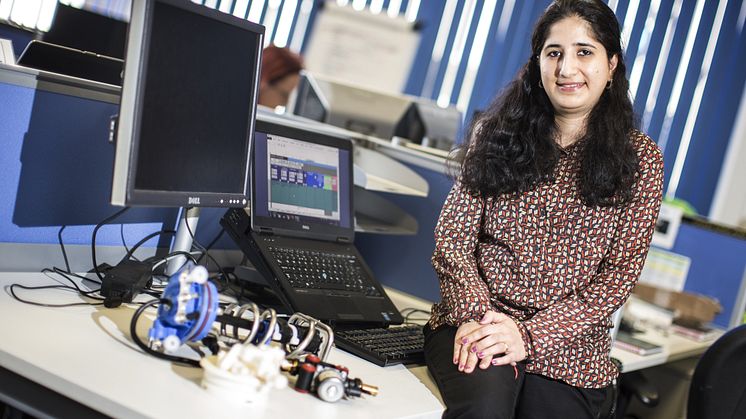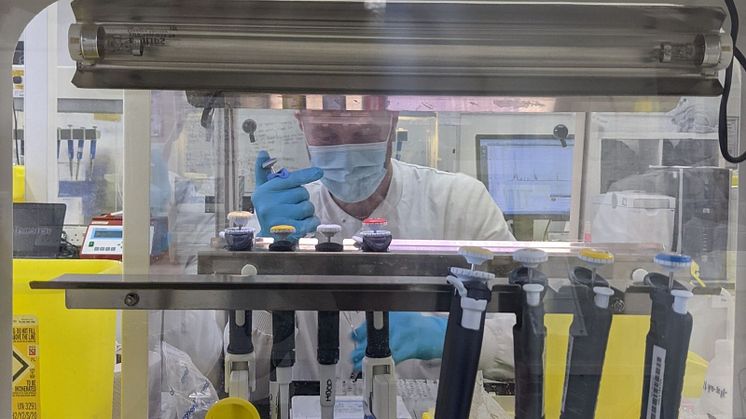
Press release -
An ‘early warning system’ for Covid-19 variants
Northumbria University is set to develop new methods for detecting Covid-19 ‘Variants of Concern’ and identifying potential ‘Variants of Interest’ following new funding from the national genome sequencing consortium, COG-UK.
Since April 2020 academics from Northumbria University have been working with partners in the government-backed Covid-19 Genomics UK (COG-UK) consortium to map how Covid-19 spreads and evolves.
COG-UK consortium members have made major contributions to the pandemic response, helping to better understand the virus and equip public health agencies, the NHS and UK government with the tools to combat Covid-19. But there is a wealth of research and development still to do, especially around variants, which have increasingly become one of the biggest concerns of the pandemic.
As part of an expansion of the COG-UK research portfolio, Northumbria University has been awarded a grant to further improve the way scientists monitor and map Covid-19.
The team will develop a computer program to screen mutations for potentially increased transmission and potential immune escape – when certain variants of the virus evolve to evade our natural or vaccine-induced resistance to it.
Dr Matthew Bashton, Vice Chancellor’s Senior Fellow in Northumbria’s Department of Applied Sciences and project lead on the research, likens the programme the team are creating to an anti-malware program for your computer. He explained: “Using information from existing studies and computer-generated simulations, we will be able to highlight what could become potential ‘Variants of Concern’ and flag them for a heightened infection control response and contact tracing. This will avoid allowing these new variants to spread and it then being too late to intervene most effectively.
“Although this can’t replace public health decision-making and lab studies, the aim is to better inform it in an automated way which compliments the UK’s widespread genomic surveillance program pioneered by COG-UK,” continued Dr Bashton.
Vital monitoring of variants
All viruses, including SARS-CoV-2, the virus that causes Covid-19, change over time. Most changes – mutations – don’t affect how the virus behaves. However, occasionally, mutations can change the properties of the virus and potentially lead to a new ‘Variant of Concern’ (VOC).
A VOC may be scientifically proven to spread more easily, be associated with more severe disease or affect the performance of vaccines, medicines, diagnostic tools or other public health and social measures.
Before a variant is categorised as a VOC, it may have been labelled as a ‘Variant of Interest’ (VOI) – a variant with specific genomic mutations linked to established or suspected negative implications such as causing enhanced community transmission or cluster outbreaks, being detected in multiple countries or being predicted to affect transmission, diagnostics, treatments or vaccine performance.
It is therefore vital that changes to the virus are monitored so that if significant mutations are identified, public health agencies, the NHS, government and the public can be informed about any changes needed to react to the variant and prevent its spread.
The new project will see the Northumbria COG-UK team working in collaboration with Professor Rafael Najmanovich at the University of Montreal who developed computational techniques that helped shed light on why the Kent variant was more transmissible (B.1.1.7), as well as the wider COG-UK network.
Dr Bashton added: “Genomic surveillance of Covid is a worldwide collaborative effort and we hope that our techniques can act as an early warning system, especially in nations that don’t have the depth of surveillance the UK has.”
Professor Darren Smith, COG-UK Deputy Director and the consortium lead for Northumbria University, said: “This is an exciting area of research being taken forward by Matthew and colleagues. The ability to detect, determine and possibly flag future ‘variants of interest’ in sequencing data, drawing in information from other existing studies, will be important in the future of genomic surveillance of SARS-CoV-2.”
Northumbria’s NU-OMICS DNA sequencing facility delivers a wide range of genome sequencing projects from Microbiome studies - helping to capture a snapshot of bacterial, fungal and viral communities in clinical and environmental studies, through to genome sequencing of bacteria, virus and fungal species. To find out more and enquire about this service, please visit the University’s NU-OMICS webpage.
-Ends-
Notes to editors:
About Northumbria University
Northumbria University, Newcastle is a research-rich, business-focused, professional university with a global reputation for academic excellence.
Northumbria is one of the largest universities in the UK with more than 30,000 students from over 130 countries
About COVID-19 Genomics UK (COG-UK)
The current COVID-19 pandemic, caused by SARS-CoV-2, represents a major threat to health. The COVID-19 Genomics UK (COG-UK) consortium has been created to deliver large-scale and rapid whole-genome virus sequencing to local NHS centres and the UK government.
Led by Professor Sharon Peacock of the University of Cambridge, COG-UK is made up of an innovative partnership of NHS organisations, the four Public Health Agencies of the UK, the Wellcome Sanger Institute and academic partners providing sequencing and analysis capacity. A full list of collaborators can be found here. Professor Peacock is also on a part-time secondment to PHE as Director of Science, where she focuses on the development of pathogen sequencing through COG-UK.
COG-UK was established in April 2020 supported by £20 million funding from the COVID-19 rapid-research-response “fighting fund” from Her Majesty’s Treasury (established by Professor Chris Whitty and Sir Patrick Vallance), and administered by the National Institute for Health Research (NIHR), UK Research and Innovation (UKRI), and the Wellcome Sanger Institute. The consortium was also backed by the Department of Health and Social Care’s Testing Innovation Fund on 16 November 2020 to facilitate the genome sequencing capacity needed to meet the increasing number of COVID-19 cases in the UK over the winter period.
Topics
Categories
Northumbria is a research-rich, business-focused, professional university with a global reputation for academic excellence. Find out more about us at www.northumbria.ac.uk --- Please contact our Media and Communications team at media.communications@northumbria.ac.uk with any media enquiries or interview requests ---
















